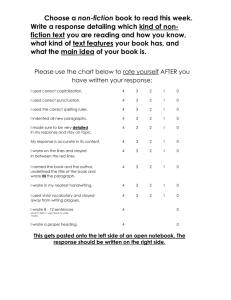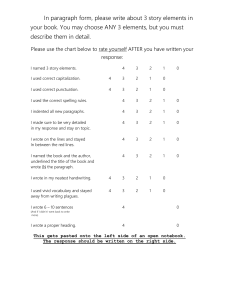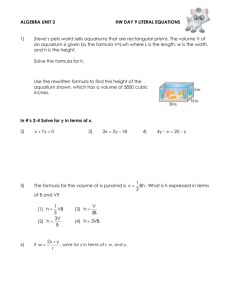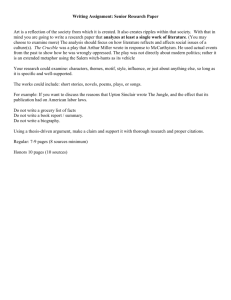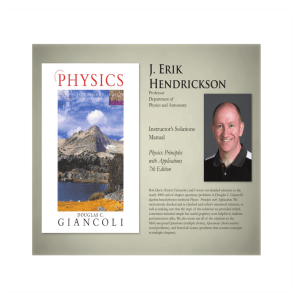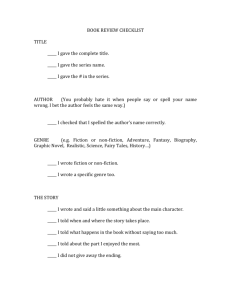AN OUTLINE OF ENGLISH LITERATURE PERIOD HISTORICAL BACKGROUND
advertisement
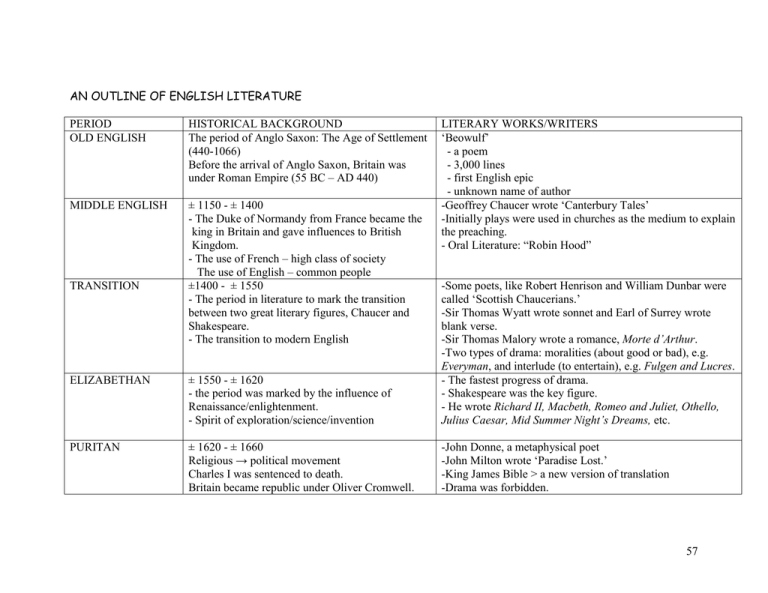
AN OUTLINE OF ENGLISH LITERATURE PERIOD OLD ENGLISH HISTORICAL BACKGROUND The period of Anglo Saxon: The Age of Settlement (440-1066) Before the arrival of Anglo Saxon, Britain was under Roman Empire (55 BC – AD 440) MIDDLE ENGLISH ± 1150 - ± 1400 - The Duke of Normandy from France became the king in Britain and gave influences to British Kingdom. - The use of French – high class of society The use of English – common people ±1400 - ± 1550 - The period in literature to mark the transition between two great literary figures, Chaucer and Shakespeare. - The transition to modern English TRANSITION LITERARY WORKS/WRITERS „Beowulf‟ - a poem - 3,000 lines - first English epic - unknown name of author -Geoffrey Chaucer wrote „Canterbury Tales‟ -Initially plays were used in churches as the medium to explain the preaching. - Oral Literature: “Robin Hood” ELIZABETHAN ± 1550 - ± 1620 - the period was marked by the influence of Renaissance/enlightenment. - Spirit of exploration/science/invention -Some poets, like Robert Henrison and William Dunbar were called „Scottish Chaucerians.‟ -Sir Thomas Wyatt wrote sonnet and Earl of Surrey wrote blank verse. -Sir Thomas Malory wrote a romance, Morte d’Arthur. -Two types of drama: moralities (about good or bad), e.g. Everyman, and interlude (to entertain), e.g. Fulgen and Lucres. - The fastest progress of drama. - Shakespeare was the key figure. - He wrote Richard II, Macbeth, Romeo and Juliet, Othello, Julius Caesar, Mid Summer Night’s Dreams, etc. PURITAN ± 1620 - ± 1660 Religious → political movement Charles I was sentenced to death. Britain became republic under Oliver Cromwell. -John Donne, a metaphysical poet -John Milton wrote „Paradise Lost.‟ -King James Bible > a new version of translation -Drama was forbidden. 57 RESTORATION ± 1660 - ± 1700 King Charles II returned from France and became the king of Britain. AUGUSTAN ± 1700 - ± 1800 -also known as Classical/Pope Period. -The power of parliament and the PM continued to grow. -London provided common meetings in the coffee houses where people talked about politics and other things. This could be the source of inspiration for the writers. ROMANTIC ± 1800 - ± 1850 -The American Revolution and French Revolution influenced the atmosphere of the period. - Society was changing → from agriculture to industry. - New Middle Class became powerful. - Movement towards greater democracy. - There positive and negative impacts of industry. - There were a lot of unemployed people, social and political problems, and sufferings. VICTORIAN ± 1850 - ± 1900 -under the reign of Queen Victoria -Rapid social change and development of economy -John Dryden wrote „Absalom & Architopel‟ → attack Charles II‟s enemies. -John Bunyam wrote Pilgrim Progress. -William Wycherley wrote plays, Love in Wood and Country Wife (exposing love affair and conspiracy). -The writers of the period tried to combined literature with public and political affairs. -The great poet was Alexander Pope. He wrote “Esssay on Man” and “The Dunciad” (a satire). -Daniel Defoe wrote Robinson Crusoe. -Jonathan Swift wrote Gulliver Travels. -Dr. Johnson wrote „The Vanity of Human Wishes.‟ -Romantic writing was mostly poetry. -William Blake wrote Songs of Innocence and Experience. -His poems are simple but symbolic. He shows the contrast between the world of nature and childhood innocence and that of social control. -William Wordsworth wrote „The World is too much with us‟, „The Rainbow‟ and „Solitary Reaper.‟ -Some other famous poets of this period were Samuel Taylor Coleridge, John Keats, and Shelley. -Jane Austen wrote Sense and Sensibility, Pride and Prejudice, and Emma. Sir Walter Scott wrote Waverly and The Bride of Lammermoor. -Mary Shelley wrote Frankenstein. -Charles Dickens was the famous writer of the period. -He showed the sufferings of children in most of his novels, he had social concern with the problems of society. 58 & technology. -the age of extremes: the poor and the rich people. -double standards: the surface, Britain was the successful society, below the surface, there were many problems. 20TH CENTURY People felt the progress of the country in all aspects of life, but they were also dissatisfied. The impacts of WW I: people became skeptical and doubtful. They also disbelieved towards social standards and ethics. -Young generation tend to blame the older generation for the war. -The end of 1920s the economic depression caused serious problems. -Nazism and Facism became the threats, but solidarity among people to defend aroused. -He wrote Nicholas Nickleby, David Copperfield, and Hard Times. Charlotte Bronte wrote Jane Eyre. Emily Bronte wrote Wuthering Heights. George Elliot (Mary Ann Evans) wrote Adam Bede. Thackeray wrote Vanity Fair. Detective novel: Wilkie Collins with The Woman in White. Arthur Conan Doyle wrote series of Sherlock Holmes. Lord Tennyson (a national poet) wrote “In Memoriam.” Robert Browning wrote “Dover Beach.” Elizabeth Barret Browning wrote “The Cry of the Children.” Rudyard Kipling wrote “The Seven Seas” and “The Five Nations.” WB. Yeats wrote “The Tower.” TS. Elliot wrote “Waste Land.” DH. Lawrence wrote Lady Chatterley’s Lover. GB. Shaw wrote a play Arms and the Man. He belonged to Fabian Society aiming to create democratic society. 59
